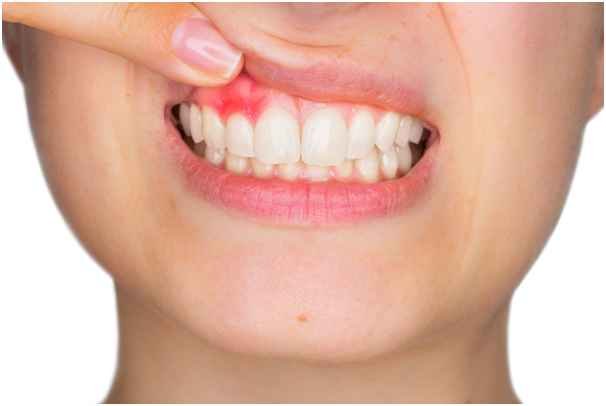Healthy or Damaged Gums: Healthy gums play a crucial role in the health of your entire oral system. These soft tissues cover and support your teeth and act as an important defense against disease in this area.
This is why it’s a red flag to have a possible sign of gum disease. These symptoms can show that you have unhealthy gums.
How can you check if you notice a change in your gums? Here’s what you need to know about healthy gums vs damaged gums.
Bleeding Damaged Gums
Bleeding gums are a sign that your gums have become damaged by bacteria and plaque build-up. The bacteria and plaque feed on the sugars and carbohydrates in the food consumed and attach themselves to the teeth and gums. This can cause inflammation of the gums, eventually leading to them breaking down.
As the gum tissue is weakened, these bacteria can spread further and cause more damage. Bacteria can also release toxins that further harm the gums and cause bleeding. By seeing the signs of bleeding gums, you can take action to remove the bacteria and protect your teeth and gums from more damage.
Swollen or Puffy Gums
Swelling in the gums may be caused by plaque build-up, gum disease, food particles lodged in the gum line, or even squeezing your gums while brushing too hard. If you have swollen gums, it is important to seek treatment immediately because it can cause more serious problems. Swelling can also be a symptom of infections like gingivitis, a serious issue if left unchecked.
Receding Gums
Gum recession can range from mild to severe, depending on the severity of the gum disease. It can cause the teeth to become more visible as the gum tissue shrinks away from the teeth.
Those with receding gums may also experience sensitivity to hot and cold temperatures due to the loss of gum. As the gum tissue recedes, maintaining proper oral hygiene may become more difficult. Bacteria and plaque can build up around the gum line of the teeth, eventually leading to further gum damage that can cause loss of teeth and serious infection.
It is important to visit the dentist to determine if you are experiencing gum recession, take proactive steps to prevent or correct it, or both. You may need treatments like gum reconstruction surgery to fix the problem and to make sure that it will not get worse. Visiting a dentist can help you learn more about gum reconstruction surgery cost as well as other preparations that you need.
Bad Breath or Taste in Mouth
When gums are damaged, bacteria can accumulate in the small spaces between the teeth and the gums, leading to bad breath. Additionally, damaged gums can lead to inflammation and poor dental health. This can create a bad taste in the mouth, as the bacteria give off odorous compounds.
To keep your gums healthy, focusing on proper oral hygiene is important. Proper brushing and flossing are essential to keep your oral hygiene in check and ensure that you do not develop damaged gums, leading to bad breath or taste in the mouth.
Loose Damaged Gums
Loose teeth indicate that you have damaged gums due to periodontal disease. Periodontal disease is the leading cause of tooth loss among adults, so taking special care of your gums is important.
When the gums become inflamed, bacteria can attack both the teeth and the underlying bone. Over time, the surrounding tissue and bone become weakened and eroded, forming gaps and spaces around the tooth. This makes the tooth weaker and can lead to it becoming loose.
Changes in the Way Teeth Fit Together When Biting
Changes in how teeth fit together when biting can indicate that you have damaged gums. This is due to the weakening of the gum tissue around the teeth and is often a result of periodontal diseases, such as gingivitis. When this happens, the teeth do not fit together as they did before, making it difficult and painful to chew, especially hard foods.
Sensitive Teeth
Sensitive teeth are a sign that you have damaged gums. When your gums recede, your teeth are exposed to external factors, including temperature and pressure changes, which can increase sensitivity. When your gums recede, the enamel of your teeth is susceptible to bacteria and acids. It can become more prone to erosion and decay. This decay can result in more sensitivity to cold food and drinks and even keep you from enjoying certain activities like ice cream.
Additionally, if the nerve inside your teeth becomes exposed, it can cause pain, particularly when coming in contact with sugary foods or cold air. By getting regular dental cleanings, you can maintain healthy gums and reduce the potential of sensitive teeth.
Pain or Discomfort When Chewing
Pain or discomfort when chewing often indicates underlying damage to the gums. Our gum tissue is vital for protecting and supporting our teeth, and any damage can cause inflammation or infection.
Damaged gums can lead to irritation and soreness when pressure or force is applied. Regular brushing and flossing help to keep our gums healthy, preventing the build-up of bacteria and tartar, which further damages the gum tissue. It’s important to care for your gums, not just your teeth, to avoid issues and maintain a healthy smile.
Pus Between Gums and Teeth
Pus is an accumulation of bacteria and other fluids. In damaged gums, the bacteria has spread deep into the tissues of the gums and has set up an infection. In some cases, this infection could even reach the bone.
Furthermore, pus often has an unpleasant odor and taste, indicating a more advanced infection. If pus is present between the gums and teeth, it is important to make an appointment with a dentist as soon as possible to treat the infection and stop it from spreading further.
Prevent Damaged Gums and More Serious Dental Problems
If you sense any changes in your gums or have concerns, you should make an appointment with your dentist. A thorough cleaning and checkup is the best way to determine if your gums are healthy or damaged.
Timely treatment can prevent costly procedures and help you avoid damaged gums and smile. Make sure you take care of your oral health today!
Did you find this article helpful? If so, be sure to check out our blog for more informative content like this.

